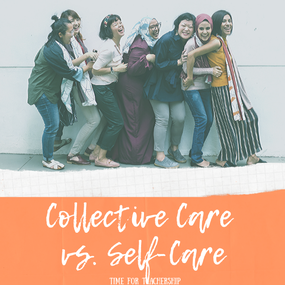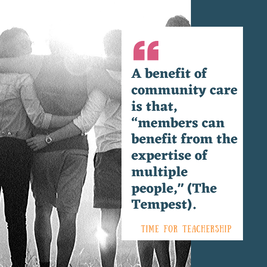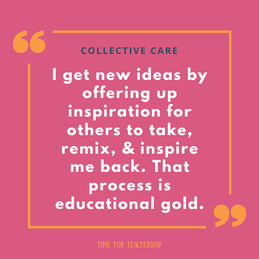|
We often talk about self-care. Often the words of Black, lesbian feminist, Audre Lorde are invoked, “Caring for myself is not self-indulgence. It is self-preservation, and that is an act of political warfare," (A Burst of Light). Certainly, it’s important to re-energize ourselves when we are worn out, but many feminists of color are reminding us to remember the last part Lorde’s quote. Taking care of one’s self is a political act. With this in mind, we can acknowledge that the notion of self-care has created a huge industry of expensive products and services, and only some people are able to afford these kinds of commodified self-care purchases. In response to this reality and as a way to keep Lorde’s original purpose in mind, many feminists argue we should practice “collective care” or “community care” as well as caring for ourselves. Nakita Valerio defines community care as, "People committed to leveraging their privilege to be there for one another in various ways.” She gives an example of picking up food or providing child care for people who are grieving (Mashable). Meg Leach’s explanation of community care as “building networks of people who can help when community members need it...making self-care possible for those who cannot achieve it on their own,” highlights the disparities in an individual’s capacity (financial or otherwise) to care for themselves. A benefit of community care is that, “members can benefit from the expertise of multiple people,” (The Tempest). At the National Women’s Studies Association Conference, women in academia provided examples of engaging in collective care work as scholars. Rather than simply seeking to advance their own number of publications and individual success, they supported one another’s research and used their personal connections to introduce each other to various people, creating new pathways for professional growth! I see the relevance for K-12 educators. Teachers have a history of hanging onto the curriculum we develop, not wanting to share it. Sometimes, this may come from a feeling of needing to compete with one another or a fear of being criticized for the quality of the work. Most of the time, though, I think it’s because we put so much work into creating original units or worksheets or whatever it is, that it just feels unfair that another teacher could just take it and use it without having to put in those tens, if not hundreds, of hours to figure it out themselves! I get it. I’ve created new curriculum for each of the 7 years I taught high school. I continue to do it at the college level. There are many times I thought, “I could make a bunch of money if I sold this on Teachers Pay Teachers,” but ultimately, I chose not to do that. Instead, I set up websites for other educators to be able to take and use anything I created. (Here is four years of my Gender Studies curriculum!) I do not fault anyone for selling their creations on TPT. Teachers just don’t make enough money. Eventually, I plan to sell online courses to educators, but up until that point, I want to provide as much free stuff as possible. I want to tell you why I choose to share most of my stuff for free... First, I can afford to do it. If I couldn’t pay the bills, you better believe I would be selling all of my stuff. Second, I love the collective care idea the scholars at the NWSA Conference talked about. When my resources can help other educators get a win, I see that as my win too. It’s certainly a win for the students in those educators’ classrooms. The third reason is a bit of a selfish one. If one teacher can take something I give away for free, and then share their adaptation of it, I learn from that! I get new ideas by offering up inspiration for others to take, remix, and inspire me back. That process, while it may not always happen, is educational gold. In the spirit of inspiring others, I encourage you to join the Time for Teachership Facebook group, and share how a free resource from this blog has led to a win for you! You can also tag me in a post on your favorite social media platform. I would love to see what you’ve been up to and how you’ve put your own spin on something I’ve shared. Let’s keep the inspiration flowing!
0 Comments
Leave a Reply. |
Details
For transcripts of episodes (and the option to search for terms in transcripts), click here!
Time for Teachership is now a proud member of the...AuthorLindsay Lyons (she/her) is an educational justice coach who works with teachers and school leaders to inspire educational innovation for racial and gender justice, design curricula grounded in student voice, and build capacity for shared leadership. Lindsay taught in NYC public schools, holds a PhD in Leadership and Change, and is the founder of the educational blog and podcast, Time for Teachership. Archives
May 2024
Categories |





 RSS Feed
RSS Feed